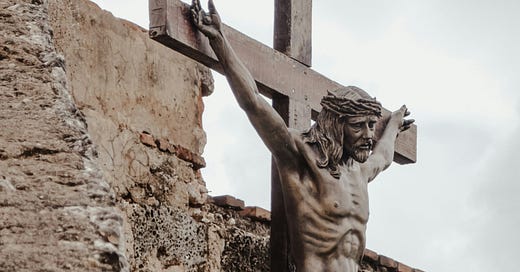Good Friday: Embracing Death, Acknowledging Sin, and Living in Hope
Today is Good Friday. A day that demands we sit in the weight of Christ’s death—heavy, sobering, and real. It was my sin, your sin, the sins of every person who ever lived that put Him on that cross. Not just the big, obvious sins, but also the small, socially acceptable ones—the pride we hide, the bitterness we nurse, the selfishness that quietly shapes so much of what we do. All of it, collectively, was laid on Him.
Jesus didn’t just die for a select few. He died for all humanity. His sacrifice wasn’t exclusive—it’s available to anyone who would place their faith in Him, confess His work on the cross, and believe in His resurrection. But while His death was for all, it’s only through faith in Him that we can fully embrace the freedom He offers. We cannot bypass the reality of our sin and the necessary response of faith. This is central to the gospel.
Christ’s death is a necessary act of atonement, but it’s also where God’s justice and mercy meet. This theological concept, called propitiation (a big word, but important), is described in Romans 3:25: “God presented Christ as a sacrifice of atonement, through the shedding of His blood—to be received by faith.” Propitiation means that Christ’s death fully satisfied the demands of God’s justice, dealing with our sins once and for all. There will never be another sacrifice needed; the price has been paid, and it’s done. It’s finished. That’s the beauty of Good Friday, even as it feels heavy.
But here’s the thing—before we jump to the resurrection, we have to sit with the truth of Christ’s death. Death isn’t something to be ignored or glossed over. As Kristoff says in Frozen 2, “Someday we will all die.” It’s a hard truth, but a truth that, when understood in light of Christ’s work, doesn’t carry the weight of hopelessness—it carries the weight of redemption. Yes, death is real. But because of Jesus, death is no longer the end.
I used to be terrified of death. As a kid, I was convinced I was dying—my parents had to take me to the doctor just to reassure me I wasn’t. I’d imagine them leaving me behind, afraid of them dying in a car wreck. I lived with this anxiety for years. But Good Friday changes everything for me now. Death is still a reality, but it is no longer the enemy it once was. Christ has defeated it.
Jesus didn’t just die to deal with our sin, but also to break the chains of death itself. The resurrection is the undeniable proof that death does not win. It cannot win. And that’s why today, we take the time to acknowledge the weight of what Christ endured. We reflect on His suffering, not to be morbid, but to recognize the depth of His sacrifice. We embrace the ugliness of our sin with godly sorrow—not to wallow in guilt, but to understand that it’s what put Jesus on the cross. Without recognizing the depth of our sin, we cannot fully appreciate the price He paid.
This is where we need to sit today—at the cross. This is where we come face to face with the reality of our brokenness. It’s uncomfortable. It’s humbling. But it’s necessary. The cross doesn’t shy away from death; it faces it directly and says, “This doesn’t get the final word.” Death doesn’t define us. It’s defeated.
But we don’t rush past the pain of Good Friday. We sit in it. We reflect. And we let the weight of what Jesus did sink in. As 1 Corinthians 15:17 says, “If Christ has not been raised, your faith is futile; you are still in your sins.” But He has been raised, and that is where our hope lies. We don’t ignore the pain, but we acknowledge the victory that was won through Christ’s death and resurrection.
So today, we embrace the ugliness of sin, the reality of death, but we do so with hope. Christ’s death is the gateway to life. His sacrifice is the foundation of our salvation. And though we face death, we do so with the hope that, because of Jesus, it is not the end. It’s actually the beginning of something far better.




